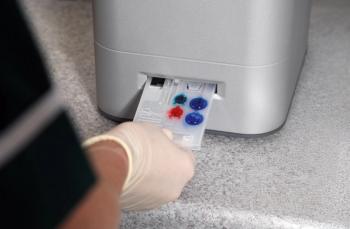
It's good to have options in veterinary ultrasound
Before you dive into Veterinary Economics product guide, Tony Pease, DVM, MS, DACVR, says to examine your options.
Ultrasound is a unique modality encompassing two skills in one. The first is acquiring images. This is a technical skill and can be taught during several sessions. Like any skill, it needs to be practiced and mastered. The second portion of ultrasound is interpretation; this takes years of practice. Radiologists have three years of advanced training and must perform more than 1,500 ultrasound examinations to become board-certified. This is the part of ultrasound training that people try to perform with limited experience and oversight.
Ultrasound is more than image recognition-it takes pathology, physiology and a knowledge of the physics of ultrasound to provide an accurate diagnosis. Here are three options I recommend you consider before investing in an ultrasound system for your practice.
1. Hire a traveling radiologist
Partner with a radiologist to perform and interpret ultrasounds at your practice on an as-needed basis.
>Requires no investment in on-going training and continuing education for staff.
>Clients and patients must wait to have ultrasound performed.
>Could eliminate the need to purchase ultrasonography equipment all together as some traveling radiologists bring a unit along.
>Purchase an ultrasound unit and have a radiologist perform the ultrasounds and teach you to perform triage ultrasound on in-house cases to perform emergency scans as needed.
Ideal for: Small practices with few cases per week or one- to two-veterinarian clinics where time to perform the ultrasound exam can be better spent seeing clients.
2. Shop out ultrasound interpretation
Keep an offsite radiologist on contract to interpret teleradiology
as needed.
>Provides expert interpretation without the wait of a traveling radiologist.
>Requires investment to train staff members to perform patient ultrasounds.
>Requires willing staff members or veterinarians.
>Provides team members opportunity for advancement.
Ideal for: Small- to medium-sized practices or emergency clinics where after-hours imaging is needed and traveling radiologists are not available.
3. Invest in staff training
Empower your team to be triage ultrasonographers.
>Requires investment in extensive and ongoing training and continuing education for staff.
>Requires willing staff members.
>Provides team members opportunity for advancement.
>Provides clients and patients readily available in-house ultrasonography service.
>Still requires radiologist or other specialists to interpret the images.
Ideal for: Busy practices, especially 24-hour facilities that require emergency images at a moment's notice.
Pease is a professor of radiology and section chief of diagnostic imaging at the Michigan State University College of Veterinary Medicine and instructs continuing education courses on ultrasonography.
Newsletter
From exam room tips to practice management insights, get trusted veterinary news delivered straight to your inbox—subscribe to dvm360.






